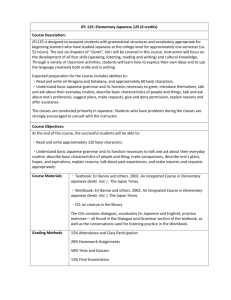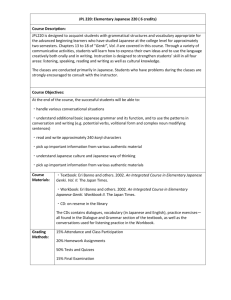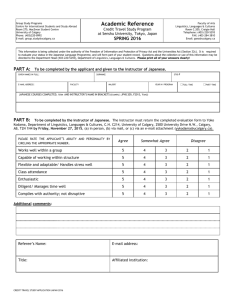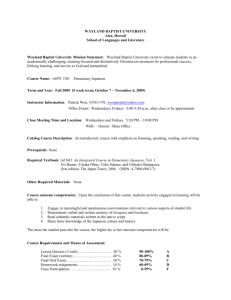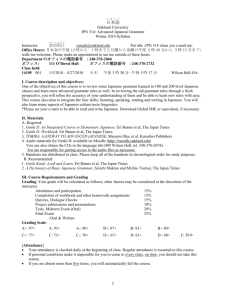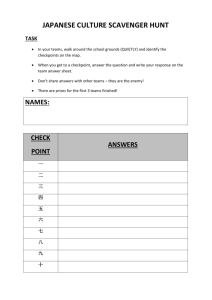PAAS 138: Introductory Japanese I Syllabus
advertisement
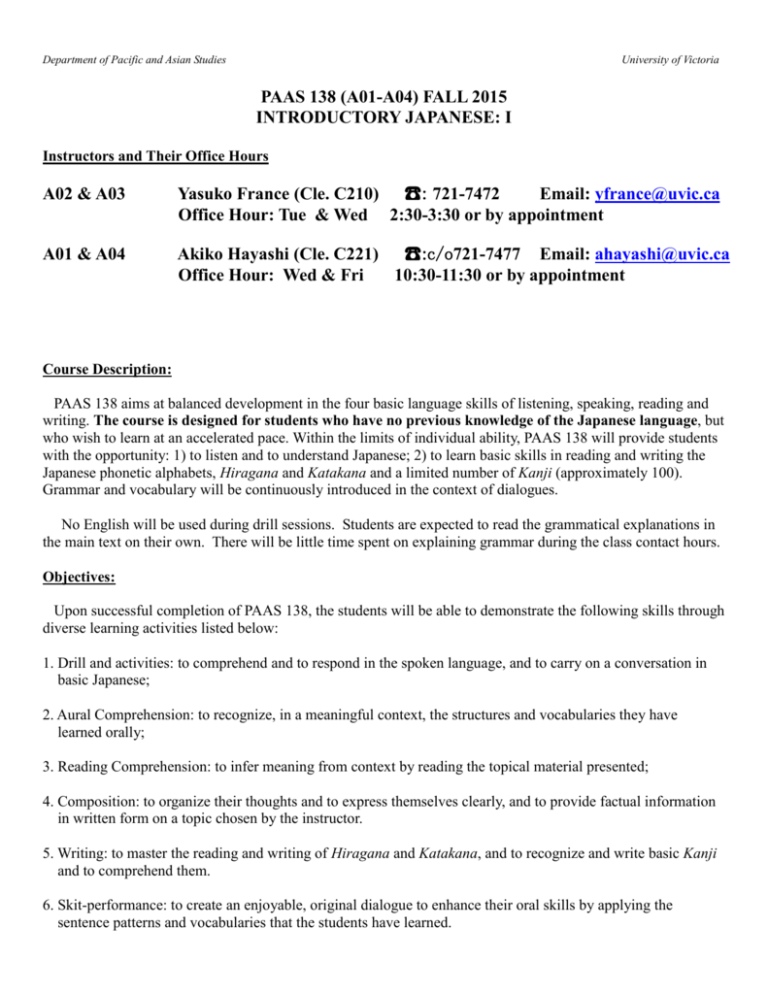
Department of Pacific and Asian Studies University of Victoria PAAS 138 (A01-A04) FALL 2015 INTRODUCTORY JAPANESE: I Instructors and Their Office Hours A02 & A03 Yasuko France (Cle. C210) ☎: 721-7472 Email: yfrance@uvic.ca Office Hour: Tue & Wed 2:30-3:30 or by appointment A01 & A04 Akiko Hayashi (Cle. C221) ☎:c/o721-7477 Email: ahayashi@uvic.ca Office Hour: Wed & Fri 10:30-11:30 or by appointment Course Description: PAAS 138 aims at balanced development in the four basic language skills of listening, speaking, reading and writing. The course is designed for students who have no previous knowledge of the Japanese language, but who wish to learn at an accelerated pace. Within the limits of individual ability, PAAS 138 will provide students with the opportunity: 1) to listen and to understand Japanese; 2) to learn basic skills in reading and writing the Japanese phonetic alphabets, Hiragana and Katakana and a limited number of Kanji (approximately 100). Grammar and vocabulary will be continuously introduced in the context of dialogues. No English will be used during drill sessions. Students are expected to read the grammatical explanations in the main text on their own. There will be little time spent on explaining grammar during the class contact hours. Objectives: Upon successful completion of PAAS 138, the students will be able to demonstrate the following skills through diverse learning activities listed below: 1. Drill and activities: to comprehend and to respond in the spoken language, and to carry on a conversation in basic Japanese; 2. Aural Comprehension: to recognize, in a meaningful context, the structures and vocabularies they have learned orally; 3. Reading Comprehension: to infer meaning from context by reading the topical material presented; 4. Composition: to organize their thoughts and to express themselves clearly, and to provide factual information in written form on a topic chosen by the instructor. 5. Writing: to master the reading and writing of Hiragana and Katakana, and to recognize and write basic Kanji and to comprehend them. 6. Skit-performance: to create an enjoyable, original dialogue to enhance their oral skills by applying the sentence patterns and vocabularies that the students have learned. 2 Textbook and learning Resources: GENKI I : An Integrated Course in Elementary Japanese, Second Edition. The Japan Times, 2011 GENKI I : Workbook, Second Edition. The Japan Times, 2011 Audio Materials: (1) MP3 CD-ROM for the textbook (comes with GENKI I, Second Edition) (2) MP3 CD-ROM for the workbook (comes with GENKI I, Second Edition) Evaluation: Letter grades will be based on the following percentage scale: 90 - 100 = A+ 77 - 79 = B+ 85 - 89 = A 73 - 76 = B 80 - 84 = A70 - 72 = B49 or lower = E, N, or F 65 - 69 = C+ 60 - 64 = C 50 - 59 = D For assigning the final grade, the following breakdown will be used. Quizzes (See attached Schedule) …………….. 6x6%@ Big Quizzes (See attached Schedule)………… 2x15% In-Class Composition ………………………… Skit Performance ……………………………... Assignments ………………………………….. 4x2.5%@ Attendance …………………………………… Total 36% 30% 7% 7% 10% 10% 100% * Attendance Guideline: You will be given the 10% attendance mark according to the following rules. [10% - 0 hr, 9% - 1 hr, 8% -2 hrs, 7% -3 hrs, 6%- 4 hrs, 5% - 5 hrs, 4% - 6 hrs, 3% -7 hrs, 2% - 8 hrs, 1% 9~10 hrs ] * A minimum grade of 73% is required to proceed to PAAS 238 (Intermediate Japanese I) Notes: 1. PAAS 138 (Introductory Japanese I) covers Lessons 1 to 8 from the textbook, GENKI. 2. Regular quizzes and exams will be administered during regular class hours and must be taken at the scheduled time. There will be no "make-up", however, exceptions may be granted for illness or other extenuating circumstances (ex. Family affliction etc). For the illness, Doctor’s Note is required to set up the make-up. 3. All assignments must be handwritten in the Japanese script and submitted at the beginning of class hour of the due date. There will be a 10% deduction for all submissions which are one day late. Any assignments that are more than two days overdue will be given 0%. No submitted assignment will lead to incomplete (N grade) grade of the course. 3 4. Students must 1) use Course Spaces regularly to support their learning and to check announcements that may be posted there, and 2) to devote a sufficient amount of time each week outside of class and review (e.g. reading Grammar Notes, writing new Kanji, memorizing vocabulary items and listening CDs). 5. Students can visit the CALL facility and listen to Genki CDs as well as watch “Mr. Yan and the Japanese People”. Please visit http://www.sfg.uvic.ca/call/m/ for more information about the CALL facility. Students' Responsibilities: 1. ACADEMIC INTEGRITY University Calendar 2014-15: http://web.uvic.ca/calendar2014/FACS/UnIn/UARe/PoAcI.html As in the university calendar, we take academic integrity very seriously. Students are expected to observe the same standards of scholarly integrity as their academic and professional counterparts. Students who are found to have engaged in unethical academic behavior, including the practices described below, are subject to penalty by the University (UVic Calendar indicated above). Examples of unethical academic behaviors are; plagiarism; multiple submission; falsifying materials and your background; cheating on assignments, tests and examinations; aiding others to cheat. (Also see attached P&A policy, page4-5) This course is designed for students who have no previous experience learning Japanese language. Thus, our department policy states that those who have scored more than 80% from the B.C. provincial exam and shall be automatically placed in PAAS 238 (Introductory Japanese II). To comply with the University’s policy on Academic Integrity (UVic Calendar indicated above), those who have studied Japanese before arriving at UVic should consult with the instructor for evaluation. Misrepresenting or falsifying previous experiences in Japanese language study is a violation of the University’s policy on academic integrity. Students who do not comply with the Policy may be subject to penalty. 2. ATTENDANCE and CONDUCT University Calendar 2014-15: http://web.uvic.ca/calendar2014/FACS/UnIn/UARe/PoAcI.html As stated in the University Calendar, "students are expected to attend all classes in which they are enrolled. A department may require a student to withdraw from a course if the student is registered in another course that conflicts with it in time.”According to the department's policy on Minimum Attendance, students are required to attend 90% of classes. Students who are absent because of illness, an accident or family affliction should report to their instructors; a doctor’s note is required to submit. Your instructor finds students entering and leaving the classroom during the lecture to be very distracting. If you know that you must leave class early on a given day, please let your instructor know before class. Also admission to a lecture or laboratory session may be refused by the instructor because of MISCONDUCT, INATTENTION or FAILURE TO MEET THE RESOSIBILITIES OF THE COURSE. Students who are repeat offenders will find their final grade reduced and may be debarred from the Big Quiz 2. 4 Department of Pacific and Asian Studies Plagiarism and Cheating The Department of Pacific and Asian Studies upholds and enforces the University’s policies on plagiarism and cheating. These policies are described on pp. 33-34 of the current University Calendar (2014/15). All students are advised to read this section. Practices that are not acceptable include: • • • • Persuading or paying someone else to write your assignments, or otherwise presenting someone else’s work as your own; Downloading essays or articles from the Internet, or copying passages from books or journals, and presenting them as your own work; Copying from another student or sharing information in examinations or tests; Bringing notes or other materials into an examination or test, except as authorised by the examiner or instructor. In addition, the following kinds of behaviour, unless specifically authorised by the instructor, are unacceptable in an examination: talking or communicating by computer or other electronic device with another student; looking at the work of other students while writing an exam; consulting books, electronic materials or other sources of information. In every course, the instructor may choose to conduct an additional oral examination, in the presence of another faculty member from the Department, so as to ascertain the level of a student’s knowledge or understanding of the course material. Departmental Policy Regarding Penalties for Plagiarism and Cheating The possible penalties for plagiarism and cheating are outlined in the Calendar. In the Department of Pacific and Asian Studies, the minimum penalty for a first offence will be an automatic F grade (0%) for the assignment, examination or test, with a note from the instructor going on file with the Department. Depending upon the seriousness of the offense and the weight of the assignment, the Instructor may assign an automatic F grade (0 GPA) for the course. Students will not be permitted to rewrite an assignment, examination or test on which they have been found to be cheating. Departmental records of cheating and plagiarism will be destroyed once a student has completed a degree program without any further offence. In the case of a second offense in the same course, the student will automatically receive an F grade (0 GPA) for the course, and the department will refer the matter to the Dean of the Faculty of Humanities. In cases where the student is on record for having plagiarised or cheated in another course, the student will receive an automatic F grade (0 GPA) for the course, regardless of whether this is a first or second offense for that course, and the matter will be forwarded to the Dean of the Faculty of Humanities for further disciplinary action. If you have any doubts about the University’s policies, or want to know if a practice is acceptable or not, you should raise your concerns with your course instructor. (Aug 14)
